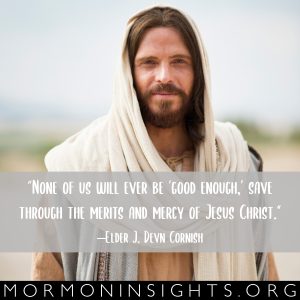Even with the commandment “be ye therefore perfect” ringing in our ears, we can still be cheerful and hopeful as we seek eternal life.
With all our weaknesses, how will we know if we’re acceptable to God? And with so many commandments to keep track of, where should we even start? Most of us at some point have felt unsure of whether we’ll make it back to God’s presence. We might feel that we’ll never be able to live up to all the standards set for us.
Elder J. Devn Cornish addresses these uncertainties in his October 2016 general conference address, “Am I Good Enough? Will I Make It?” He assures us that while being good enough is impossible on our own, we absolutely will make it if we “keep repenting and do not rationalize or rebel.”
However, this reasoning could result in thinking we have to be perfect to gain our salvation or thinking God’s grace will free us from any responsibility. Elder Cornish presents a balance between these two extremes. He says, “None of us will ever be ‘good enough,’ save through the merits and mercy of Jesus Christ, but because God respects our agency, we also cannot be saved without trying. That is how the balance between grace and works works.”
Jesus once told Martha, “Thou art careful and troubled about many things: But one thing is needful” (Luke 10:41–42). Like Martha, we may be caught up in and overwhelmed by the multitude of commandments, counsel, and good ideas we have received. We may wonder just what that one needful thing is. Elder Cornish states that the Lord’s standards for us are clearly defined in the temple recommend interview questions. These questions are designed to help us stay in line with gospel teachings.
God wants us to succeed, and Jesus Christ makes that possible. If we keep repenting and keep trying, we will make it.
Source: ChurchofJesusChrist.org
—Christy Eck, Mormon Insights
FEATURED IMAGE BY AMBER KIPP
Find more insights
Watch Elder Joseph B. Wirthlin explain the commandment to “be ye therefore perfect.”
Read a discussion of perfection in the Liahona.
Read Elder Jeffrey R. Holland’s talk “Be Ye Therefore Perfect—Eventually.”



